Filter by

Multiplying in the Spirit: African Initiated Churches in Zimbabwe
This volume was motivated by the realisation that AICs continue to be a significant player on Zimbabwe’s spiritual market. Members of predominantly Apostolic, but also Zionist, churches are highly visible in both rural and urban areas. Prophets from AICs are constantly in the news, alongside advertising their competence in urban areas. Thus it is high time to bring AICs being an important par…
- Edition
- -
- ISBN/ISSN
- 9783863092559
- Collation
- -
- Series Title
- -
- Call Number
- 306.6 GUN m
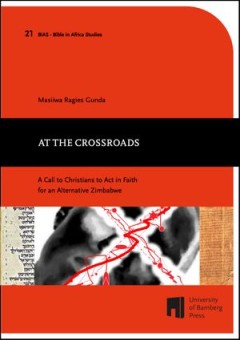
At the Crossroads: A Call to Christians to Act in Faith for an Alternative Zi…
Zimbabwe, a country that is made up of around 80% of Christians find itself as among the worst administered countries, among the most corrupt nations and overflowing with injustice. This paradox urges to question the role of Christianity in shaping the morality of the nation and in creating a just society for all its citizens. While acknowledging the major role played by politics and politician…
- Edition
- -
- ISBN/ISSN
- 9783863096120
- Collation
- -
- Series Title
- -
- Call Number
- 306.6 GUN a
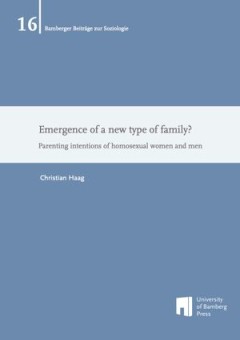
Emergence of a new type of family?: Parenting intentions of homosexual women …
Christian Haag holds a diploma degree in Sociology from the University of Bamberg and also studied at the National University of Ireland in Galway. He has taught and researched at the chair of Sociology I at the University of Bamberg, at the State Institute for Family Research at the University of Bamberg (ifb), and at the Goethe University Frankfurt. His work is focussed on social inequality, …
- Edition
- -
- ISBN/ISSN
- 9783863094454
- Collation
- -
- Series Title
- -
- Call Number
- 306.8 HAA e
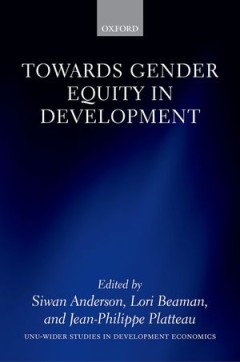
Towards Gender Equity in Development
As a result of widespread mistreatment and overt discrimination in all dimensions of their lives, women lack significant autonomy. The central preoccupation of this book is to explore key sources of female empowerment and discuss the current challenges and opportunities for the future. Schematically, three main domains are distinguished. The first is marriage and women’s relative bargaining p…
- Edition
- -
- ISBN/ISSN
- 9780198829591
- Collation
- -
- Series Title
- -
- Call Number
- 361.1
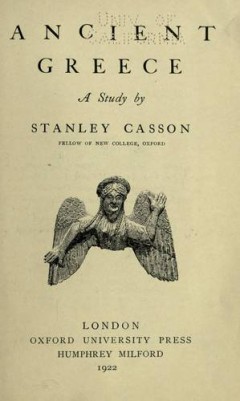
Ancient Greece: A Study
This book lends a wonderful insight into the cultural legacy that the world of ancient Greece has handed down to mankind through the prevailing centuries. Author Stanley Casson delves into the writings of Plato and others to examine the great leaders and minds that influenced both ancient Greek culture as well as our own.
- Edition
- -
- ISBN/ISSN
- -
- Collation
- -
- Series Title
- -
- Call Number
- 320 CAS a
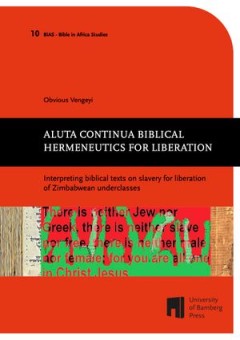
Aluta continua biblical hermeneutics for liberation: Interpreting biblical te…
This book was passed as a PhD thesis at Bayreuth University, Germany. The author challenges African Biblical scholars and Christian leaders to premise Biblical interpretation on the experiences of the often neglected underclasses. The author argues that from a comparative historical, cultural and material methodological point of view, the experiences of the Zimbabwean underclasses whose collect…
- Edition
- -
- ISBN/ISSN
- 9783863091675
- Collation
- -
- Series Title
- -
- Call Number
- 306.6 KUG a

African Pentecostalism, the Bible, and Cultural Resilience: The Case of the Z…
The study investigates the resilience of Shona religion and culture among ZAOGA Pentecostal Christians. It endeavours to establish whether the Pentecostal Christians in Zimbabwe, through a case study of ZAOGA, have embraced aspects of Shona traditional religion and culture. Through an application of phenomenological-comparative approach as well as fieldwork, the study confirms continuity, chang…
- Edition
- -
- ISBN/ISSN
- 9783863097141
- Collation
- -
- Series Title
- -
- Call Number
- 306.6 BIR a
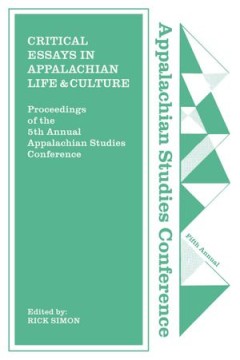
Critical Essays in Appalachian Life & Culture
The proceedings from the 1982 Appalachian Studies Conference, edited by Rick Simon, Grace Edwards, Ron Eller, Joan Moser, and Barry M. Buxton, includes contributions by Rick Simon; Ronald D. Eller; Deborah Morentz Markley and Brady J. Deaton; William W. Philliber and Phillip J. Obermiller; Virginia McCoy Watkins and Diana Gullet Trevino; Grace Toney Edwards; Harold Branam; Parks Lanier; Joan Mo…
- Edition
- -
- ISBN/ISSN
- 9781469636832
- Collation
- -
- Series Title
- -
- Call Number
- 306.4 SIM c
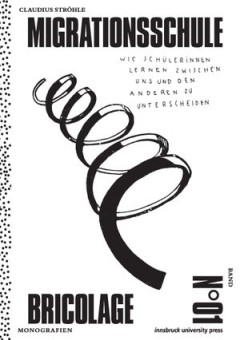
Migrationsschule
At school, not only arithmetic and writing is taught. Pupils also learn to behave male or female, which means to be poor or rich - and to distinguish who is considered ""foreigner"" and who is not. In order to understand the significance of migration and ethnicity in everyday school life, the author accompanied and observed teachers and pupils at a new middle school in Tyrol. The resulting obse…
- Edition
- -
- ISBN/ISSN
- 9783903122765
- Collation
- -
- Series Title
- -
- Call Number
- 572.9 STR m
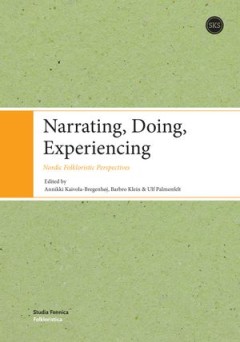
Narrating, Doing, Experiencing
How do people tell of experiences, things and events that mean a lot to them and are unforgettable? Eight Nordic folklorists here examine personal experience stories and the way they are narrated in an attempt to gain an understanding of the people behind them and to reveal how these people handle their history, their lives and their cultural memory. All the articles are based on interviews and…
- Edition
- -
- ISBN/ISSN
- 9789518580648
- Collation
- -
- Series Title
- -
- Call Number
- 301 PAL n
 Computer Science, Information & General Works
Computer Science, Information & General Works  Philosophy & Psychology
Philosophy & Psychology  Religion
Religion  Social Sciences
Social Sciences  Language
Language  Pure Science
Pure Science  Applied Sciences
Applied Sciences  Art & Recreation
Art & Recreation  Literature
Literature  History & Geography
History & Geography